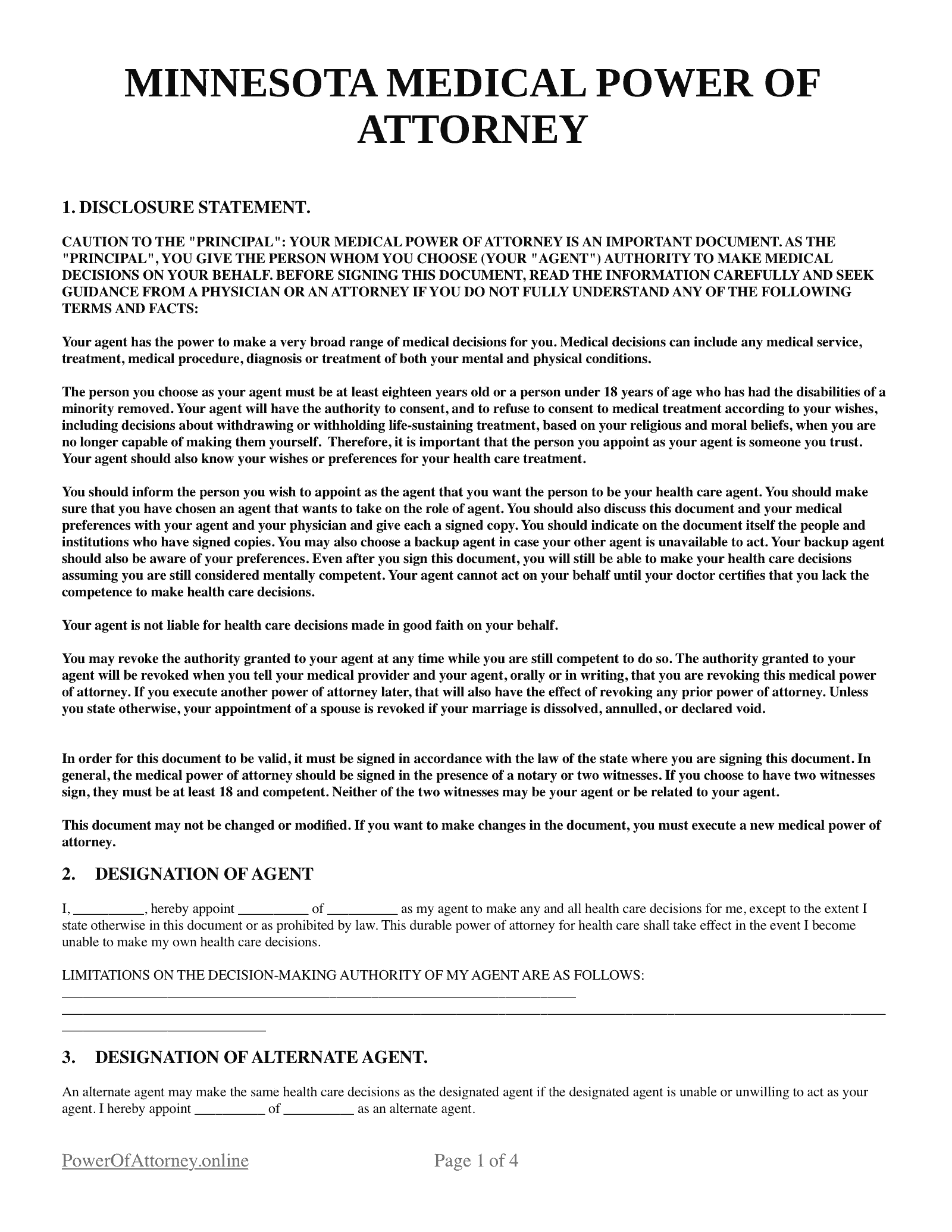Free Minnesota Medical Power of Attorney Forms
There may come a time when medications and certain treatments have to be done regularly. Stopping a treatment plan suddenly may complicate a person’s health condition.
This is why it’s ideal to have a valid medical power of attorney (POA) form. It is a legal document that allows a person, referred to as the principal, to authorize another to make healthcare-related decisions on their behalf. The authorized individual is known as the agent.

Minnesota Medical Power of Attorney Laws
- Healthcare Directives - The law dictates how Minnesota medical POAs are enforced. According to the regulation, the healthcare agent must be at least 18 years old. It describes the POA as “an instrument appointing one or more healthcare agents to make healthcare decisions for the principal” (MN Stat §145C.01).
- Healthcare Directive Requirements - To be considered legal in Minnesota, the form must be in writing, properly dated, have the principal’s name, and include their healthcare instructions.
Signing Requirements in Minnesota
Every state has different signing requirements for a healthcare POA. Since it acts as written permission for an agent to make medical decisions on behalf of the principal, valid POAs in Minnesota must be made in writing, and the principal must sign it. If, for any reason, the principal is unable to sign the form themselves, the principal can authorize another to sign on their behalf.
Additionally, it must “contain verification of the principal’s signature or the signature of the person authorized by the principal to sign on behalf of the principal, either by a notary public or by witnesses” (MN Stat §145C.03).
How To Write a Medical POA in Minnesota
A notable feature of the medical POA is it continues to be effective even when the principal is declared legally incompetent. Here’s how to write a medical POA in Minnesota.
1. Choose an Agent You Can Trust
The printable document acts as an agent’s power to make healthcare decisions on behalf of the principal. As a principal, you want someone who will have your best interest at heart. Many choose their family members.
A spouse or partner is usually the agent of choice because the principal knows they will take the responsibility seriously. Other principals choose a sibling, parent, child, and other close relatives. Keep in mind that they must be of legal age to qualify as an agent.
However, a principal can also select a person not related to them by blood. Sometimes, the person you trust most is not a relative. For some, electing someone unrelated is a way of sparing family members from heartbreak, especially when it comes to making end-of-life decisions for them.
2. Discuss the Powers in the Document
Set a meeting with the person you intend to appoint as an agent. It’s important to lay down your instructions so the agent will understand your preferences in terms of medications, treatments, procedures, and possible end-of-life care. This provides clarity and helps ensure that your wishes are carried out when the time comes.
While not mandatory, the agent is also entitled to receive compensation for the responsibility, so this should also be mentioned. Aside from compensation, the agent can ask for reimbursements for transportation, meals, and lodging if they shoulder such expenses while carrying out their responsibilities.
3. Prepare the Minnesota Medical Power of Attorney Form
Download a Minnesota medical POA form online. It is convenient because it has all the necessary wordings for a POA. All you need to do is fill it out with your specific instructions. Be as specific and clear as possible.
4. Sign the Document
Sign the written medical POA. If you’re unable to sign the document physically, you can ask somebody else to do it. The document must be verified by a notary public or witnesses.
5. Use the Medical Power of Attorney in Minnesota
The agent can now use the document that you signed. The agent must present it to the concerned entity every time they make a healthcare decision on your behalf. Most healthcare facilities will ask for the original copy. These could be physicians, nutritionists, and owners of healthcare or end-of-life-care facilities.